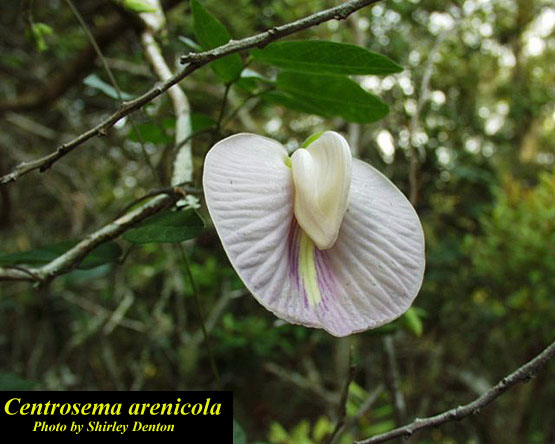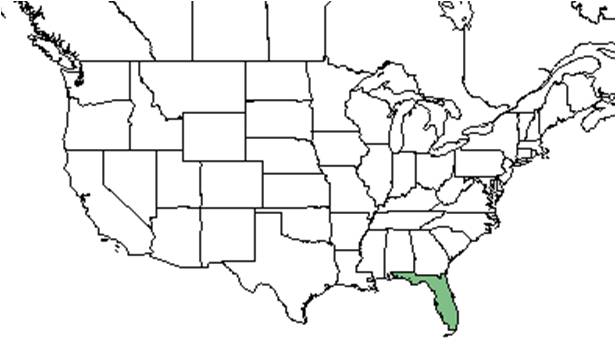Difference between revisions of "Centrosema arenicola"
KatieMccoy (talk | contribs) |
|||
| Line 18: | Line 18: | ||
}} | }} | ||
Common name: pineland butterfly pea | Common name: pineland butterfly pea | ||
| − | ==Taxonomic notes== | + | <!--==Taxonomic notes==--> |
| − | ==Description== | + | <!--==Description==--> |
<!-- Basic life history facts such as annual/perrenial, monoecious/dioecious, root morphology, seed type, etc. --> | <!-- Basic life history facts such as annual/perrenial, monoecious/dioecious, root morphology, seed type, etc. --> | ||
| − | ==Distribution== | + | <!--==Distribution==--> |
==Ecology== | ==Ecology== | ||
===Habitat=== <!--Natural communities, human disturbed habitats, topography, hydrology, soils, light, fire regime requirements for removal of competition, etc.--> | ===Habitat=== <!--Natural communities, human disturbed habitats, topography, hydrology, soils, light, fire regime requirements for removal of competition, etc.--> | ||
| Line 29: | Line 29: | ||
===Phenology=== <!--Timing off flowering, fruiting, seed dispersal, and environmental triggers. Cite PanFlora website if appropriate: http://www.gilnelson.com/PanFlora/ --> | ===Phenology=== <!--Timing off flowering, fruiting, seed dispersal, and environmental triggers. Cite PanFlora website if appropriate: http://www.gilnelson.com/PanFlora/ --> | ||
Flowers in August and September (FSU Herbarium). | Flowers in August and September (FSU Herbarium). | ||
| − | + | <!--===Seed dispersal===--> | |
| − | ===Seed dispersal=== | + | <!--===Seed bank and germination===--> |
| − | ===Seed bank and germination=== | + | <!--===Fire ecology===--><!--Fire tolerance, fire dependence, adaptive fire responses--> |
| − | ===Fire ecology=== <!--Fire tolerance, fire dependence, adaptive fire responses--> | ||
===Pollination=== | ===Pollination=== | ||
The following Hymenoptera families and species were observed visiting flowers of ''Centrosema arenicola'' at Archbold Biological Station (Deyrup 2015): | The following Hymenoptera families and species were observed visiting flowers of ''Centrosema arenicola'' at Archbold Biological Station (Deyrup 2015): | ||
| Line 40: | Line 39: | ||
Megachilidae: ''Megachile integra, M. mendica'' | Megachilidae: ''Megachile integra, M. mendica'' | ||
| − | ===Use by animals=== <!--Herbivory, granivory, insect hosting, etc.--> | + | <!--===Use by animals===--> <!--Herbivory, granivory, insect hosting, etc.--> |
| − | ===Diseases and parasites=== | + | <!--===Diseases and parasites===--> |
| − | ==Conservation and Management== | + | <!--==Conservation and Management==--> |
| − | ==Cultivation and restoration== | + | <!--==Cultivation and restoration==--> |
==Photo Gallery== | ==Photo Gallery== | ||
==References and notes== | ==References and notes== | ||
Revision as of 14:50, 19 January 2016
| Centrosema arenicola | |
|---|---|

| |
| Photo by Shirley Denton, Atlas of Florida Vascular Plants | |
| Scientific classification | |
| Kingdom: | Plantae |
| Division: | Magnoliophyta - Flowering plants |
| Class: | Magnoliopsida - Dicotyledons |
| Order: | Fabales |
| Family: | Fabaceae ⁄ Leguminosae |
| Genus: | Centrosema |
| Species: | C. arenicola |
| Binomial name | |
| Centrosema arenicola (Small) F.J. Herm. | |

| |
| Natural range of Centrosema arenicola from USDA NRCS Plants Database. | |
Common name: pineland butterfly pea
Ecology
Habitat
In the Coastal Plain in Florida, C. arenicola has been found to occur in upland hardwood associations of Quercus and Sabal palmetto (FSU Herbarium). Associated species include Quercus, Myrica, Sabal palmetto, Eupatorium, Galactia, and Clematis (FSU Herbarium).
Phenology
Flowers in August and September (FSU Herbarium).
Pollination
The following Hymenoptera families and species were observed visiting flowers of Centrosema arenicola at Archbold Biological Station (Deyrup 2015):
Apidae: Bombus pennsylvanicus
Megachilidae: Megachile integra, M. mendica
Photo Gallery
References and notes
Deyrup, M.A. 2015. Database of observations of Hymenoptera visitations to flowers of plants on Archbold Biological Station, Florida, USA.
Florida State University Robert K. Godfrey Herbarium database. URL: http://herbarium.bio.fsu.edu. Last accessed: October 2015. Collectors: Olga Lakela. States and Counties: Florida: Citrus, Hernando, Hillsborough. Compiled by Tall Timbers Research Station and Land Conservancy.